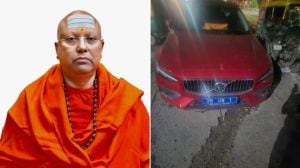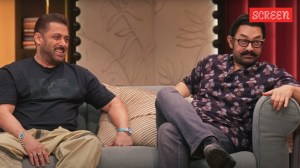Obama on India
In a letter written during Singh’s US visit in September, Obama wrote on the Indo-US nuclear deal to say that he was pleased to vote by proxy for the agreement in the Senate Foreign Relations Committee.

As a US Senator and then as a Democrat Presidential nominee, Barack Obama has brought up India in his campaign speeches, articles, interviews, at college and university gatherings, and in a letter he wrote to Prime Minister Manmohan Singh in September this year.
Letter to Manmohan Singh
In a letter written during Singh’s US visit in September, Obama wrote on the Indo-US nuclear deal to say that he was pleased to vote by proxy for the agreement in the Senate Foreign Relations Committee. Not only did he vouch to vote in favour of the deal—he had earlier introduced a killer amendment during the debate on the Hyde Act which was withdrawn—what he said next was the most reassuring bit for the Indian government. He wrote, “If time should run out in the current Congress, I will resubmit the agreement next year as president.”
He said he strongly supported the civil nuclear cooperation because, he wrote, “I believe it will enhance our partnership and deepen our cooperation on a whole range of matters…” He then went on to list the areas of cooperation.
First, he wrote, “Our common strategic interests call for redoubling US-Indian military, intelligence, and law enforcement cooperation. The recent bombings remind us that we are both victims of terrorist attacks on our soil, and we share a common goal of defeating these forces of extremism.”
Second, he said, “We should be working hand-in-hand to tap into the creativity and dynamism of our entrepreneurs, engineers, and scientists to promote development of alternative sources of clean energy,” he said.
Obama had also expressed the hope that a civil nuclear cooperation agreement can open the door to greater collaboration with India on non-proliferation issues and listed CTBT and FMCT as high priorities. “I am committed to the goal of a world without nuclear weapons, and will make this a central element of US nuclear weapons policy.”
While this may not be music to the ears of South Block mandarins, former Ambassador to the US, Lalit Man Singh, is optimistic since the US President-elect believes and emphasises on “multilateralism, cooperation and consultations”. Former diplomat Arundhati Ghose, however, is cautious: “Obama is still untested. What he said during his campaign speeches will not necessarily become policy.”
India-US
“The world’s oldest democracy and the world’s largest democracy are natural partners, sharing important interests and fundamental democratic values. Already, in communities across (the US), Indian Americans are lifting up our economy and creating jobs. Leading entrepreneurs, innovators, lawyers, doctors, engineers and hardworking professionals are adding to the richness and success of the American society.”
February 23, 2008, in an article in a local Indian-American newspaper
India-Pak
“Now you’ve got a fledgling democratic government (in Pakistan). We have to support their efforts to democratise. That means, by the way, not just providing military aid, it means helping them to provide concrete solutions to the poverty and lack of education that exists in Pakistan. So I want to increase non-military aid to Pakistan. But we also have to help make the case that the biggest threat to Pakistan right now is not India, which has been their historical enemy, it is actually militants within their own borders. And if we can get them to refocus on that, then that is going to be critical to our success not just in stabilising Pakistan but also in finishing the job in Afghanistan.”
November 1, 2008, interview to CNN
On India’s skilled force
“Now businesses not only have the ability to move jobs wherever there’s a factory, but wherever there’s an internet connection…Countries like India and China realised this. They understood that now they need not just be a source of cheap labour or cheap exports. They can compete with us on a global scale. The one resource they still needed was a skilled, educated labour force. So they started schooling their kids earlier, longer, and with a greater emphasis on math, science, and technology, until their most talented students realised they don’t have to immigrate to America to have a decent life—they can stay right where they are…”
“Today, accounting firms are emailing your tax returns to workers in India who will figure them out and send them back as fast as any worker in Indiana could. When you lose your luggage in a Boston airport, tracking it down may involve a call to an agent in Bangalore, who will find it by making a phone call to Baltimore. Even the Associated Press has outsourced some of their jobs to writers all over the world who can send in a story with the click of a mouse.”
Obama’s remarks at Knox College Commencement at Galesburg, Illinois
Outsourcing
“When it comes to jobs, the choice in this election is not between putting up a wall around America or standing by and doing nothing. The truth is, we won’t be able to bring back every job that we’ve lost, but that doesn’t mean we should follow John McCain’s plan to keep promoting unfair trade agreements and keep giving tax breaks to corporations that send American jobs overseas. I will end those breaks as President, and give them to companies that create jobs here in the United States of America.”
Obama’s last campaign speech at Jacksonville, Florida, on November 3
India and climate change
“By now, the Bush administration’s record oIn climate change is almost legendary…This is the administration that didn’t try to improve the Kyoto Treaty by trying to include oil guzzlers like China and India, but walked away from the entire global effort to stem climate change.”
Speaking in Chicago on April 3, 2006,on ‘Energy Independence and the Safety of our Planet’
Photos





- 01
- 02
- 03
- 04
- 05


























